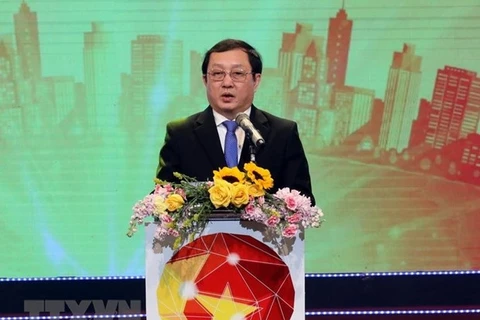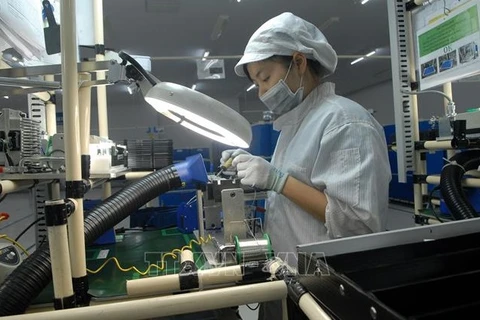 Manufacturing wooden furniture for export to the US market at Trieu Phu Loc company in Binh Duong province. (Photo: VNA)
Manufacturing wooden furniture for export to the US market at Trieu Phu Loc company in Binh Duong province. (Photo: VNA) Hanoi (VNA) - The Vietnam Chamber of Commerce and Industry (VCCI) has suggested adding regulations related to digital transformation to the draft law on amending and supplementing a number of articles in the Law on Intellectual Property (IP).
They include a number of procedures that need to be conducted online such as registration and establishment of IP rights.
Digital transformation is becoming a global and an inevitable trend in Vietnam, especially in the implementation of administrative procedures or those directly serving business activities, meeting the requirements of international economic integration.
The Law on IP was promulgated in 2005 and was amended and supplemented in 2009 and 2019. However, it should be adjusted to meet the new development requirements of the country, institutionalise the guidelines of the Party and State, and overcome the inadequacies of the current law, especially in the context of the Fourth Industrial Revolution, according to the VCCI. The amendments also aim to meet international commitments related to IP rights and ensure harmony and consistency in the Vietnamese legal system.
Currently, the draft law only regulates the submission of copyright registration dossiers through the online public service portal, while data on trademarks and industrial designs are incomplete and haven’t been updated by the National Office of Intellectual Property, the VCCI said.
 The Vietnam Chamber of Commerce and Industry has suggested adding regulations related to digital transformation to the draft law on amending and supplementing a number of articles in the Law on Intellectual Property. (Photo: VNA)
The Vietnam Chamber of Commerce and Industry has suggested adding regulations related to digital transformation to the draft law on amending and supplementing a number of articles in the Law on Intellectual Property. (Photo: VNA) According to the VCCI, the Law on IP recognises and protects many types of intellectual property such as copyright and related rights in software, information systems and industrial property with respect to business secrets. However, some issues have not been clarified, causing many difficulties. Specifically, the concept of business secrets in the Law on IP is still too general and confusing.
The law stipulates that trade secrets include information obtained from financial and intellectual investment activities that have not been disclosed and could be used in business.
It is the relatively unclear regulations on business secrets that make the application of this regulation in each case depend on the understanding of state agencies. This has led to debates about what data should be considered a business secret and what protection mechanisms should be in place. In situations of data theft, state agencies are still hesitant to consider them a type of intellectual property that needs to be protected.
The law also has not defined the concept of “intellectual property”, so there is confusion in defining a contract with an object of intellectual property.
If in many other economic sectors, the largest asset value for an enterprise is a factory, equipment, construction, etc, the most valuable asset in the digital economy is software, data, information system, copyright of books, music, movies, entertainment programs, art, etc. These are all objects protected under the Law on IP.
According to the VCCI, IP protection for digital economic development is important to promoting investment in the fields of industry and high-tech agriculture. Therefore, it is necessary to consider adding to the Law on IP the institutions that recognise and protect all kinds of IP in the digital environment towards protecting personal property rights./.























